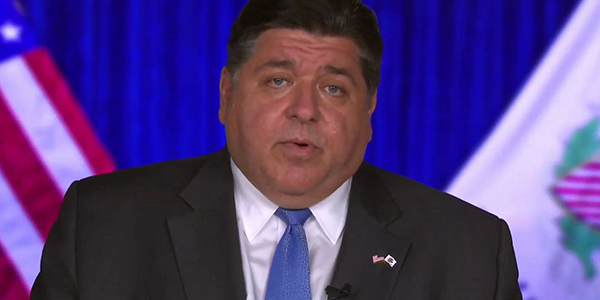Illinois Gov. J.B. Pritzker told a virtual gathering of PJM stakeholders Wednesday that his state’s transition to cleaner energy is “non-negotiable,” but he emphasized the need for collaboration with the RTO.
Pritzker delivered the keynote address for PJM’s General Session stakeholder meeting, headlining a group of diverse speakers on the topic of resource adequacy and the RTO’s capacity market.
Throughout his speech, the governor stressed the “urgent need” to address climate change and pointed out that it is a common goal among many states in PJM.
“We all know well that systems transform faster when all their players and parts are willing to move,” Pritzker said. “So, it’s important that we work together to move toward an ethical, affordable, clean and renewable energy economy as soon as we can.”
Pritzker said he hopes PJM and MISO will work with Illinois and other states in allowing capacity markets to reflect their desire for clean energy.
“Beyond addressing capacity market issues, we’re interested in working with PJM to make further progress toward rules that recognize and enhance clean energy to advance the clean energy economy,” he said. “With a commitment to doing what’s right, we can pave the way to a clean and renewable economy, not just for Illinois, but for all of PJM’s member states and, in turn, the nation.”
“Bold action,” he said, is needed to tackle climate issues in the Midwest as the region sees record-breaking flooding and extreme droughts. He said that his energy plan, released last month, prioritizes both consumers and climate change. He said he welcomes the help of PJM and its stakeholders to achieve its goals. (See Exelon to Close Ill. Nukes as Gov. Touts Clean Energy Plan.)
“I know this group that eats, sleeps and breathes the details on how we get there and is going to dive right in,” Pritzker said.
The governor also said there is a need to strengthen utility company transparency and ethics requirements. Utility companies “can no longer write the state’s energy policies behind closed doors,” he said, pointing to the recent bribery scandal with Commonwealth Edison and its parent company, Exelon. Pritzker said Exelon must open its books for a “transparent, independent and expert review of finances” to do a proper investigation. (See ComEd to Pay $200 Million in Bribery Scheme.)
He also called for changes to state laws to incentivize rapid development of renewable energy, including putting a price on carbon emissions. State policies must be developed in an open setting with engagement from stakeholders impacted by energy policy, including utility ratepayers, he said.
CEO’s Perspective
Speaking earlier in the session, PJM CEO Manu Asthana said it’s “imperative” that the RTO resume a schedule of regularly occurring capacity auctions as soon as possible.
Asthana said PJM’s markets add between $3.2 billion and $4 billion of value annually through the benefits of scale, efficient operations and the power of competition. He said competition in the markets has led to reductions in wholesale power prices and a 34% reduction in carbon emissions since 2005.
“These auctions and PJM’s other markets add significant value, and that value can’t be taken for granted,” Asthana said.
The pace of change in the energy industry is accelerating, Asthana said, and is driven by a change in technology, including batteries, offshore wind and smart grid technologies.
The RTO is also seeing changes in consumer preferences towards decarbonization, Asthana said, along with changes in public policy, as Illinois and some other PJM states take “aggressive steps” to decarbonize their generation.
Asthana said PJM stakeholders have said they are open to starting a conversation about a long-term solutions to resource adequacy challenges. He pointed out that of the 107,000 MW of generation currently in PJM’s interconnection queue, about 86% is either solar, wind, or batteries.
“This is not some distant theoretical change that we’re talking about,” Asthana said. “This change is here now.”





